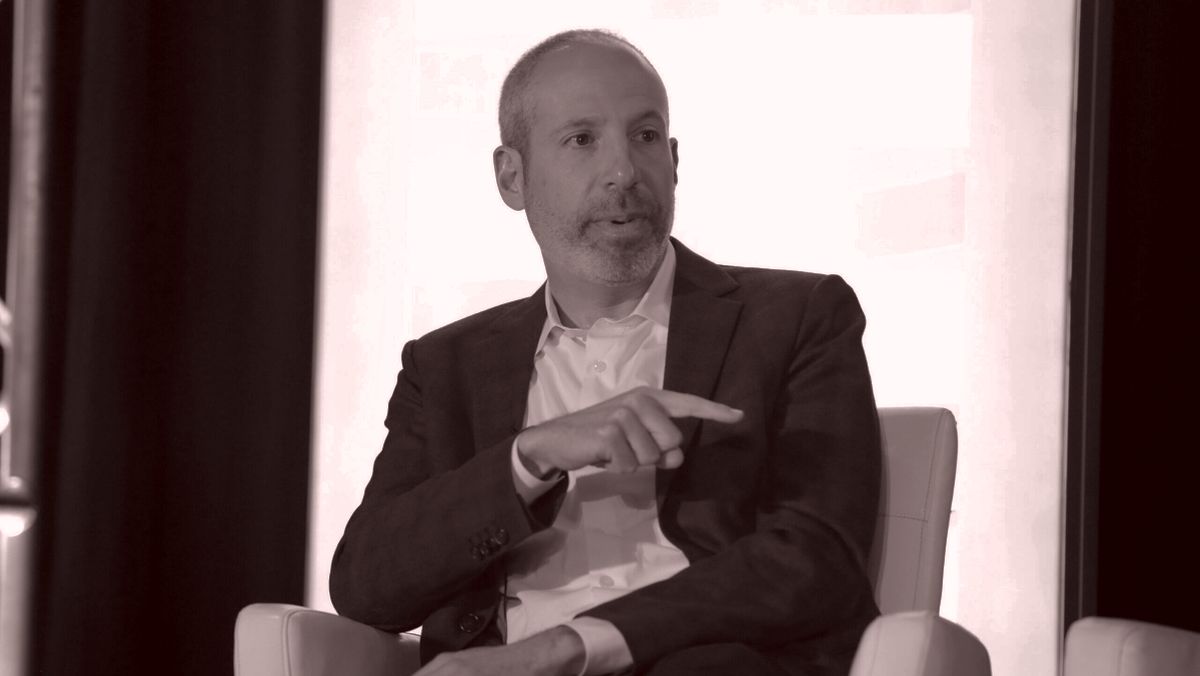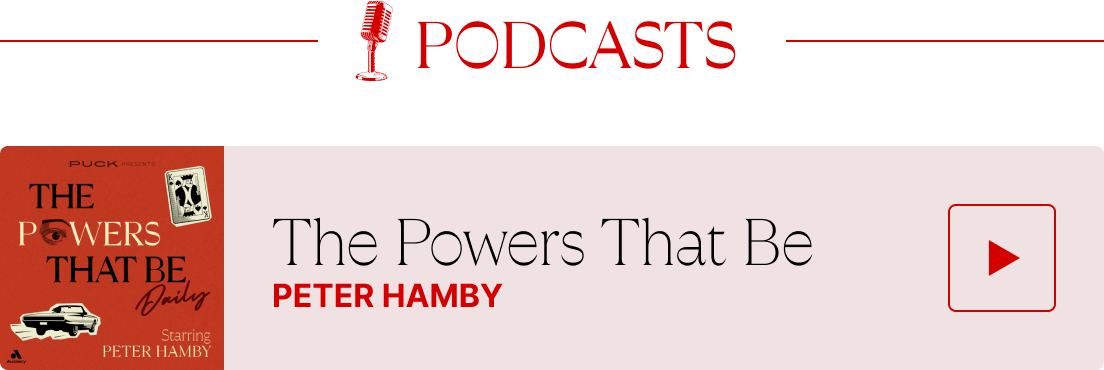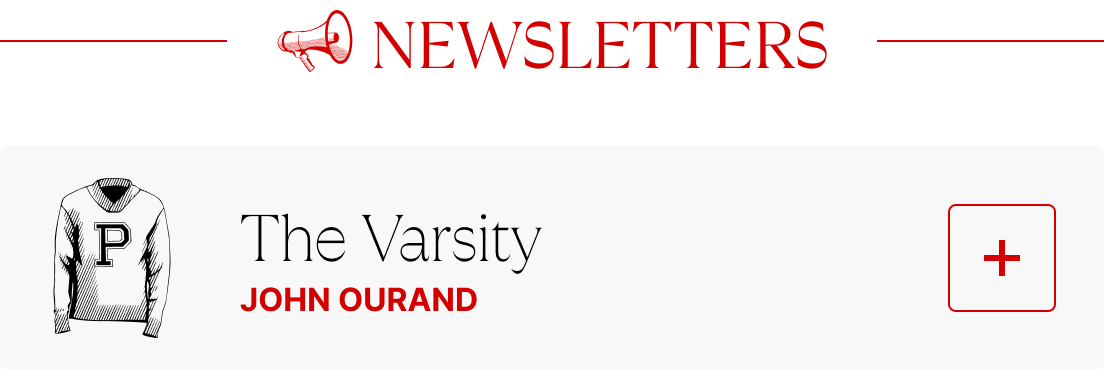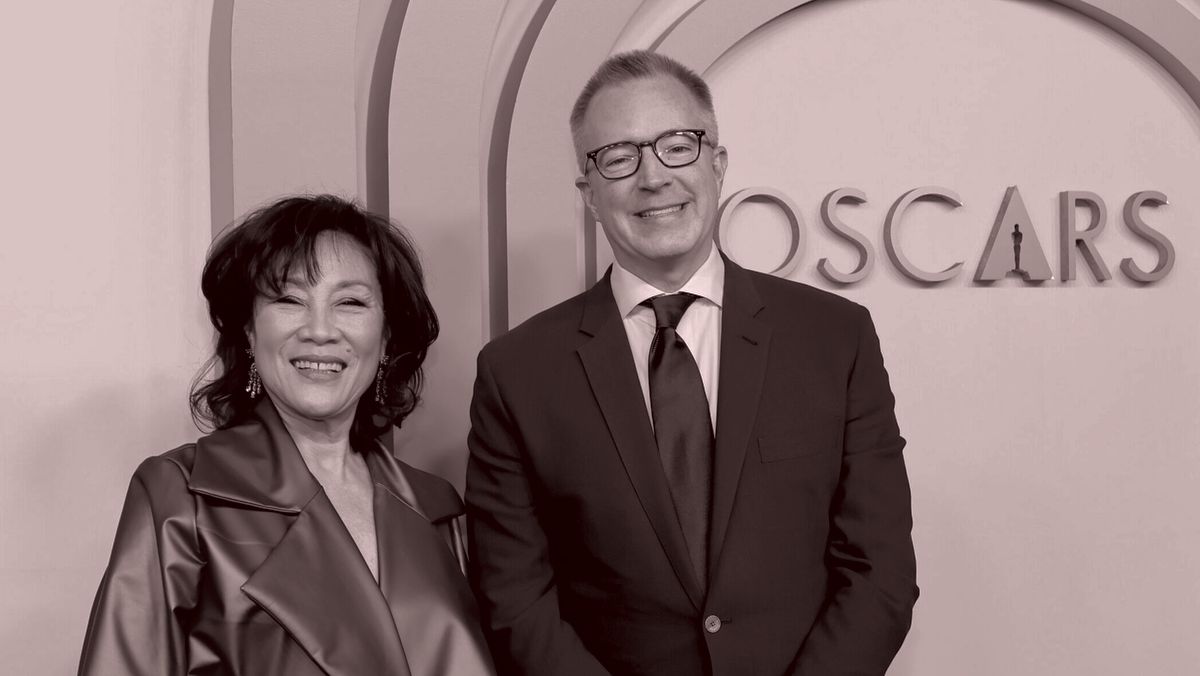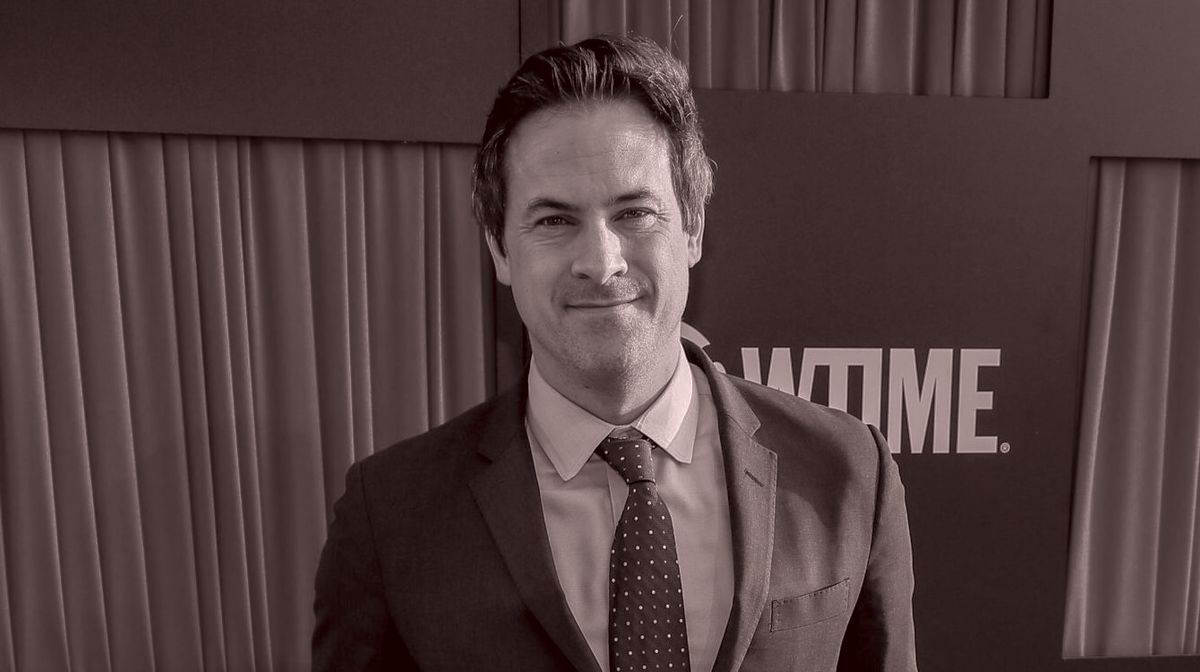Greetings from Los Angeles, welcome back to In the Room, happy
Oscars weekend, and safe travels for those of you who are headed to Aryeh’s very off-the-record MediaSlopes summit in Park City on Sunday. I’m going off the grid myself this weekend, so please forgive any delayed responses.
🍸 In tonight’s issue, my candid, no-holds-barred conversation with former NBC News president Noah Oppenheim about the media industry’s
uncertain future, from the chaos engulfing MSNBC to the future of SpinCo to the fate of NBC News. (Plus, Noah shares how he helped bring Netflix’s hit Robert De Niro–led cyberattack series, Zero Day, to life.) If you want to listen to the full episode, follow The Grill Room on Apple,
Spotify, or wherever you get your podcasts.
Also mentioned in this issue: Jeff Bezos, Gayle King, Mark Lazarus, Will
Lewis, David Muir, Rebecca Kutler, Kristen Welker, Kaitlan Collins, Savannah Guthrie, Elon Musk, Brian Glenn, and many more…
But first…
|
- One giant leap: As you’ve no doubt heard by now, Gayle King has announced that she will be going to space on a Blue Origin flight with Lauren Sánchez, Katy Perry, and other members of an all-female crew. CBS Mornings spent more than half an hour teasing the big reveal this week, but the response from viewers—and, indeed, some of Gayle’s own colleagues—hasn’t exactly been enthusiastic. The litany of
comments on this Instagram post from Gayle, CBS, and Blue Origin are indicative of the reservations about the anchor’s participation in the Bezos-owned company’s P.R. stunt. Of course, Gayle can do whatever she wants, or at least whatever CBS will allow, but last I checked, the news division’s journalists weren’t even allowed to let third
parties pay for their flights out of JFK.
- WaPo woes, cont’d: Speaking of Bezos, his decision to refashion the Washington Post Opinion page as a bulwark for “personal liberties and free markets” has—in addition to pissing off the David Maraniss types and forcing David Shipley’s transfer to The New York Times (more on that below)—catalyzed another sizable subscriber exodus. Per NPR’s David
Folkenflik, the perennial thorn in Will Lewis’s side, the Post has lost more than 75,000 subscribers in the 48-odd hours since Bezos’s announcement. Of course, that’s on top of the more than 300,000 subscribers who already left in the wake of his decision to withhold the paper’s presidential endorsement for Kamala Harris.
Yes, these are sizable losses for a paper that has only 2 to 3 million subscribers to begin with, but Bezos’s
willingness to tolerate them—I assure you, he’s not losing sleep over this—is yet another reminder of the true scope of his ambition. He’s not fighting over the margins of the “Democracy Dies in Darkness” crowd anymore. His true goal is to turn the Post into a broader, post-partisan, upscale, everything-for-everyone news site that services tens of millions (some day). In any event, it goes without saying that he can take the subscriber hit, and that the protests of the
old guard probably only make him feel more emboldened. This is his DOGE.
- Matters of Opinion: In response to Bezos’s mandate, The Wall Street Journal, which has been in the “free markets, free people” space for some time, kindly welcomed Post Opinion thusly: “[It] will be good to have a wingman in the fight,” the editorial board wrote. “As for our discerning readers, our respectful counsel is: Accept no substitutes. Sample the
competition but come back for the real thing.” Across town, New York Times Opinion editor Kathleen Kingsbury has announced that Shipley, the outgoing Post Opinion editor, will be joining Times Opinion as editorial director. She also reasserted the paper’s commitment to maintaining an editorial board: “I know that some publications have retreated from having editorials or an editorial board in recent years. A.G. and I
have chosen to do the opposite. We believe that The Times’s editorial board can be a crucial voice in these challenging times.”
- A CNN exit: The executive producer for Kaitlan Collins’s primetime show abruptly resigned from the network this week for reasons that are not entirely clear. Kristin Donnelly, a seven-plus year veteran of the network, informed colleagues that the “brutal” hours were “taking a
toll,” as Status first reported last night, but most folks at the network I spoke with today don’t think it’s that simple. CNN sources I surveyed described her as hardworking, gracious, and dedicated to the job, and didn’t have a single negative thing to say. In any case, if you know anything, please don’t hesitate to reach out…
- Finally…: The White House’s move to control media access by blocking unfavorable outlets and determining press pool
participation has already made for some tragically depressing theater. After the explosive and historic confrontation between Trump and Vance and Zelensky in the Oval Office today, Brian Glenn, a reporter from the pro-Trump Real America’s Voice—and, per The Washington Post, Rep. Marjorie Taylor Greene’s boyfriend—used everyone’s valuable time at a historic moment to ask Ukraine’s leader why he never
wears a suit. “A lot of Americans have problems with you not respecting the dignity of this office,” Glenn said. Zelensky told Glenn he would wear “a costume,” maybe “something like yours, maybe something better,” after the war was over.
|
|
|
A candid discussion with Noah Oppenheim, the former NBC News president, about
the headaches at his old haunt (and other industry pickles) as the television news business wades through a series of not-great options.
|
|
|
In the past week, NBCUniversal’s now-splintering news empire endured some
significant ruptures: Lester Holt announced his long-anticipated resignation at Nightly News, new MSNBC president Rebecca Kutler unveiled a slate of very notable programming changes, and in response, Rachel Maddow took it upon herself to put Kutler and SpinCo chief Mark Lazarus on blast on behalf of the 30 Rock proletariat. I wrote about all these developments earlier this week—including,
most notably, some of the eye-rolling among MSNBC insiders over Maddow’s attempt to play woman of the people. (Addendum: In noting her residences in Manhattan and the Berkshires, I may have overlooked a multimillion-dollar home in historic Provincetown.)
In any event, it seemed like a very fitting time to bring former
NBC News president Noah Oppenheim into the studio for an interview on The Grill Room, my twice-weekly podcast on the media business. Noah left the NBC mothership—and the news business—two years ago to return to his other passion, screenwriting, and is now on the press circuit for his new hit Netflix series, Zero Day, a Robert De Niro–led political thriller that occasionally dips its toe into some of the most pressing issues he dealt
with as the leader of a broadcast news division: trust, accountability, authority, and so on. We spoke about all that—Maddow, Lester, the inexorable decline of linear television, etcetera—and more in our discussion, portions of which follow below. (If you want to listen to the full episode, follow The Grill Room on Apple,
Spotify, or wherever you get your podcasts.) As always, this conversation was lightly edited for clarity.
|
Inexorable Decline Coffee Talk
|
Dylan Byers: The decline of the industry is
no secret to anyone. And obviously, since you’ve left, NBC has spun off MSNBC. Your jurisdiction was always NBC News, but I wonder what you thought when you heard the news that they were going to spin this off, and Mark Lazarus was going to run the cable companies.
Noah Oppenheim: I’ve been in these chairs, and I know how difficult all of these decisions are—the big ones and the small
ones—and you’re making dozens of them a day. And from the outside, sometimes the forces influencing those decisions are opaque, and it looks like it’s a bunch of knuckleheads running the show.
First of all, I think Mark Lazarus is as smart an executive as you’ll find. He’s a guy who didn’t shy away from making hard decisions and really tried to figure out how to make this a better business. So for
the people at SpinCo, they at least have the benefit of being led by somebody who I think is courageous in his decision-making, smart, and clear-eyed about the business. I think there’s a real opportunity for them to do something interesting with it. SpinCo sort of felt like an inevitability.
If you want to be optimistic about it, you say this is an opportunity for them to lean into the strengths of those
brands, unencumbered by consideration for what it might do, for instance, to NBC News. There was always that healthy tension with MSNBC’s greatest value, which in my opinion was as a progressive opinion brand. And there was always this pretense to not lean too far in that direction, because it might reflect back on the core NBC News brand in ways that weren’t helpful. Now they’re liberated. They can say, Alright, we own a progressive opinion brand, and let’s see what we can do with
it.
I understand the future of MSNBC without NBC News, but what’s the future of NBC News without MSNBC?
I think parts of it are clearer than others. The easy one is the Today show. It’s an incredibly healthy lifestyle brand, and I think it’s better thought of in that bucket than as a news property.
It is news, and I would still argue that the first 20 minutes of the Today show is as good a summary of the day’s news as you can find. And it’s obviously anchored by, in my opinion, the best hard news journalist at NBC in Savannah Guthrie. But, its revenue is derived from its lifestyle programming and e-commerce business. I think Today probably has a smaller future than what it was 25 years ago, but I still think it’s a healthy and profitable one.
As for the future of an evening newscast at 6:30? You’d think that’s the diciest one. Because in a world with ubiquitous news and information at our fingertips on our phones, who needs to sit down every night and have somebody read it to us? With that being said, the audience for those shows is still sizable. It’s still multiples of the number of people watching cable news on any given day. So
there’s still something there.
There seems to be an audience of at least, when you add it up, 20 million people a day who want to watch a down-the-middle summary of what’s happening in the world. The amount of revenue that throws off is going to continue to shrink for a variety of reasons. But there does seem to be an audience for the product. I think the big question mark—both a challenge and an opportunity—is
whether their streaming product, NBC News Now, can continue to scale. We’ve seen the cable universe go in the direction of opinion. That seems to be what people want from them, but maybe there’s still an audience for a 24/7 hard news product. That’s the niche that NBC News Now could potentially fill. I think the jury is still out on that.
|
I see a path for really strong brands like
Today because they have an e-commerce business—and for the people who are fans of those shows, they feel an immense amount of loyalty toward Savannah Guthrie, for instance. You could see something that, on streaming, continued to appeal to people as sort of the morning routine. It’s harder for me to see that future for the evening news, Meet the Press…
Yes. Then it becomes not so much Meet the Press or evening news. The question is: David Muir, or Kristen Welker, or Stephanopoulos? I think there will always be an audience for news presented by trusted figures whom that audience relates to. I could certainly imagine a world—if David Muir left ABC tomorrow, and said he was going to launch a product on streaming where he summarized the day’s
events—I think there are a lot of people in America who love hearing about the world presented by David Muir. I think Kristen Welker, who’s doing a terrific job moderating Meet the Press, has an audience as much as Meet the Press does as a brand. I think the future for all of this is going to be tied probably more to those individual personalities, as you’ve seen in the podcast space and the Substack space. Although, I do think those legacy brands retain value,
particularly among older audiences.
If you’re sitting where Rebecca Kutler is right now, how do you manage [the chaos engulfing MSNBC]? Obviously, Rachel Maddow is your biggest star, but you are also ostensibly the boss of the network, and have a pretty strong conviction in what your game plan is for the next two or three years. What advice can you offer?
Well, first off, I should say I’m enormously grateful that I’m not sitting there. These jobs have always been, and continue to be, quite difficult. And you’ve identified what has always been an odd dynamic in these places, which is that you have the folks who are ostensibly in charge, and the on-air stars who make far more money and have far bigger megaphones and a direct line to an audience. So the question of who’s
more powerful, or really calling the shots, has always been an interesting one in the television business.
I think all one can do in these situations—and it seems like Rebecca and Laz are doing exactly this—is be decisive and be transparent with the workforce. It’s hard to work at a legacy media company when legacy media is going through seismic upheaval. There’s often an assumption—this is true of
journalists who cover the business—that those making the decisions are intentionally holding back, when in fact it’s often just that it takes time to arrive at a course of action. It takes time to put all the pieces in place that are necessary to make it work. You can hold that conversation and those moves as close to the chest as possible, but the more people you bring into those dialogues, the more chances they have to leak.
And then you make hard decisions, and unfortunately for everyone, change is hard. Sometimes it means forging a new path for oneself, either within the company, or at a different place, or in a different way. But I’d say again, just act quickly and as decisively as possible. And I haven’t seen any reason to think that’s not exactly what they’re doing.
I look at this media landscape and
I think, at the risk of hyperbole, that it is the greatest threat to our national security. And I say that for the following reason: Every other threat you think about—whether it’s another terror attack, God forbid, or Russia, or a nuclear incident, or climate change—we cannot begin to confront any one of these challenges for as long as we exist in this paralysis of separate truths.
And we’ve seen what disunity can do to
countries and how it can very much impact their level of security. I look at it every day, and it’s terrifying to me, as this system has kind of hardened into these fiefdoms. In the same way that you could have made a lot of money a long time ago selling cigarettes that really weren’t great for people, there are a lot of people now who are selling the civic equivalent of cigarettes. Because the audience wants it; it makes them feel good; they can make a lot of money. But what are we doing to the
country?
|
I think one of two things need to happen here to address the threat:
Either legacy institutions like NBC News need to come up with a really robust strategy for a post-linear future, or one of these new influencers is going to have to take on Walter Cronkite–level trustworthiness with the American people. I think that’s very uncertain territory ahead.
For sure. Not only do you need individuals who can amass that kind of
trust and credibility, but what’s lost is that there’s an infrastructure that’s necessary in order to do this well, if you’re trying to capture the most accurate available picture of the truth at any given time. And let’s be clear, journalism is an imperfect practice. Part of the crisis in trust is that for a long time, some of these institutions were not forthcoming enough about how imperfect this all was. You have a lot of people working very hard to get it right, but that does not
mean that they always get it right. But the infrastructure that a large organization like NBC News or CNN has—the standards and practices department, the career ladder, the ability to start as a P.A. and then gradually climb the chain, so that by the time you’re making decisions, you’ve got five, six, 10 years of experience under your belt—those things are critical.
You can’t just walk out into the world
with a phone and an Instagram account and expect to do responsible journalism consistently over time. You can get it right occasionally, but these systems weren’t built just for the sake of wasting big corporations’ money. They were built because they were deemed to be necessary for good reason to make sure that mistakes weren’t made very often. One of the sad pieces of the decline of these legacy institutions is they’re replaced by folks who may not have the same philosophical
commitment to pursuing the truth, but also not the resources to do it in a way that doesn’t result in a lot of mistakes and inaccuracies.
So you don’t subscribe to the Elon Musk thesis, “You are the media.”
To use another metaphor—like the drug problem, it’s a supply-and-demand problem. There is a
supply problem in that we have a lot of bad actors out there who are flooding the zone with intentional falsehoods in pursuit of a malicious agenda. We also have people with ideological agendas who may not be as overtly dishonest, but pick and choose their facts to construct a picture that’s useful to their ideological agenda. You’ve got a lot of people contributing to this problem on the supply side.
On the demand side, the audience is choosing to consume this. And
at a certain point, so long as individual consumers click on this stuff and watch this stuff instead of the more staid middle-of-the-road brands, it’s on us, because we do have a choice. We can subscribe to responsible news outlets; we can choose to get our news from reputable sources. But a lot of people at scale would rather scroll through TikTok and do it that way. And I don’t know how you address that issue.
|
|
|
Join Emmy Award-winning journalist Peter Hamby, along with the team of expert journalists at Puck, as they let you
in on the conversations insiders are having across the four corners of power in America: Wall Street, Washington, Silicon Valley, and Hollywood. Presented in partnership with Audacy, new episodes publish daily, Monday through Friday.
|
|
|
A professional-grade rundown on the business of sports from John Ourand, the industry’s preeminent journalist,
covering the leagues, players, agencies, media deals, and the egos fueling it all.
|
|
|
Need help? Review our FAQ page or contact us for assistance. For brand partnerships, email ads@puck.news.
You received this email because you signed up to receive emails from Puck, or as part of your Puck account associated with . To stop receiving this newsletter and/or manage all your email preferences, click here.
|
Puck is published by Heat Media LLC. 107 Greenwich St, New York, NY 10006
|
|
|
|

